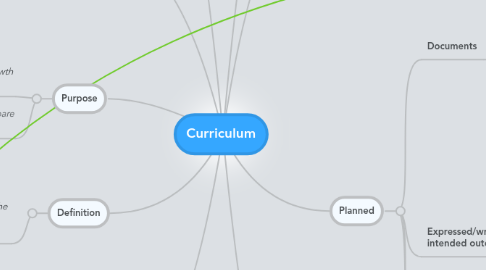
1. Teaching Worldview
1.1. Assumptions
1.1.1. Goal of curriculum is to provide learners with information for storage and future use.
1.1.2. Curriculum prepares learners for work. Other irrelevant non-academic subjects are useless to school.
1.1.3. Writing lesson plans is not important. Real teacher don't do that.
1.1.4. Curriculum tries to satisfy the needs of both teachers and learners.
1.1.5. Curriculum is just words on paper. If you understand it, you can teach it.
1.1.6. Teachers change subjects and learning activities to accommodate students' short attention span.
1.1.7. Tests should all have a strict time limit to be fair to all students
2. Purpose
2.1. To encourage students' intellectual growth and desire to learn
2.2. To develop young people's character to prepare them for the workforce
3. Foundational Ideas
3.1. Decisions
3.1.1. Reporting
3.1.2. Measurement
3.1.3. Evaluation
3.1.4. Assessment
3.2. Development
3.2.1. Designed by teachers, administrators, and hired curriculum developers
3.2.2. 4 General Ideas
3.2.2.1. Provincial department of education policy
3.2.2.2. School board initiatives
3.2.2.3. Parent-teacher advisory groups
3.2.2.4. Teachers
3.3. Implementation
3.3.1. Teaching Qualities
3.3.1.1. Conscientious
3.3.1.2. Thoughtful
3.3.1.3. Reflective
3.3.1.4. Carefully reading the curriculum and trying to understand the meaning of its words
3.3.2. Tools for Teachers
3.3.2.1. Teacher Resource Manual
3.3.3. To "live" curriculum, role of the teacher
3.4. Assessment
4. Task of Teachers
4.1. To achieve the goals of the program of studies
4.2. Translate the complex curriculum into learning experiences for students (implementing the curriculum)
4.3. Designing learning experiences based on curriculum, and sometimes also take part in curriculum planning
5. Definition
5.1. The programs of study, subject guides, and school-specific policy decisions that affect the ways of working and general conduct in a school.
6. Non-Formal/Null (Empty)
6.1. What is NOT taught in schools
6.1.1. e.g. World Religions class that was not taught in school
6.2. Learning Outcome
6.2.1. Students do not learn the knowledge, skills, and attributes involved
6.2.2. Students learn that this must not be important knowledge
7. Planned
7.1. Documents
7.1.1. Teacher Resource Manual
7.1.1.1. Specifies how a teacher may design learning experiences, what textbooks best support achievement of goals, and what alternative subject matter ideas might be introduced
7.1.1.2. Supplementary materials provided and created by school boards
7.1.1.2.1. By practising teachers and education specialists
7.1.1.3. Provides teaching ideas, resource suggestions, websites, and practical help in designing and implementing learning activities
7.1.2. Program of Study
7.1.2.1. Specifies the purposes, goals, and intended outcomes of a subject (e.g. Science or Math) for each grade
7.1.3. Textbooks, worksheets, other prints/texts
7.1.3.1. Represent a point of contact between learner and subject matter
7.1.3.2. Selected by school district, and often recommended by a school
7.1.3.3. Must be approved by the provincial department of education
7.2. Expressed/written statement of goals and intended outcomes within subject matter
7.3. Content of subject matter organized in ways to best achieve the set goals/intended outcomes as determined by province
7.3.1. e.g. Phys. Ed. curriculum includes goals of physical education, such as to promote physical activity, fitness development and a healthy lifestyle.
7.3.2. General goals among each province's curricula can be quite similar
7.3.3. Most curricula include actual subject matter/content of the program
7.4. Design
7.4.1. Debate among teachers with different approaches
7.4.2. Provincial departments of education hire teachers as consultants and writers, and/or directors of instruction as full-time employees
7.4.3. Final decision rests on provincial department of education
8. Hidden
8.1. Unintended learning outcomes
8.1.1. e.g. Favouritism
8.2. Sometimes can be more powerful than planned curriculum
9. Extra-Curricular Activities
9.1. Participation
9.1.1. e.g. Sports teams, clubs, drama (play)
9.1.2. Contributes greatly to learner's growth and development
9.1.2.1. Participants have greater chances of proceeding to post-secondary institutions
9.1.2.2. Participants display lower incidence of criminal behaviour
9.1.2.3. Participants typically perform better in academic subjects
